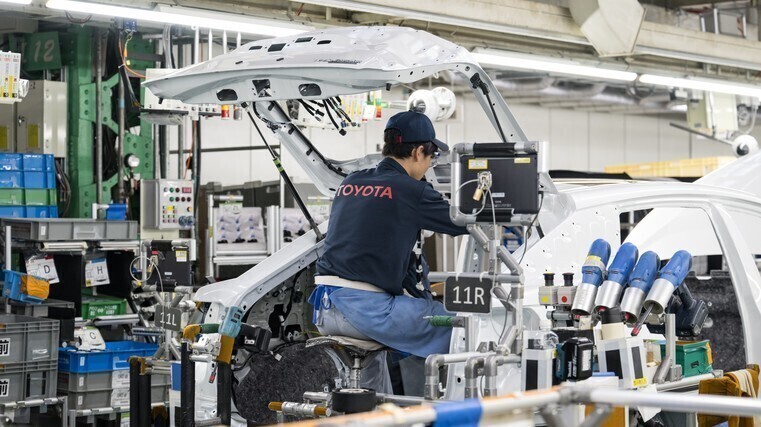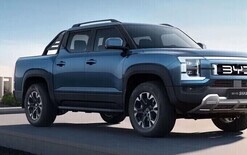Car tariffs back on agenda

The American president says he’s exploring possible temporary exemptions to tariffs on imported vehicles and parts to give companies more time to set up factories in the US.
“I’m looking at something to help car companies with it,” Donald Trump told reporters. “They’re switching to parts made in Canada, Mexico and other places, and need a bit of time because they’re going to make them here.”
The president was asked what short-lived product exclusions he was considering, but has yet to specify how long a pause or lowering of automotive levies might stay in place.
Trump’s comments on April 14 could bring relief to manufacturers reeling from his duties on car and light-truck imports. On the flipside, they inject more uncertainty into his tariff plans.
Japan hasn’t escaped Trump’s trade blitz despite being the biggest investor into the US. The levies include 25 per cent on cars and a “reciprocal” duty of 24 per cent on most other Japanese imports. They were suspended last week for 90 days along with most other nations.
In addition, Japanese steel and aluminium exports to America face a tariff of 25 per cent, while Japan is also included in Trump’s blanket 10 per cent levy.
The tariffs on the car industry could be the most biting because the US is Japan’s biggest export destination and motor-vehicle shipments account for roughly 28 per cent of its exports there.
Tokyo’s envoy for upcoming tariff talks, Ryosei Akazawa, was expected to depart for Washington on April 16 to meet senior US officials. The talks are expected to cover tariffs, non-tariff barriers and exchange rates.
The levies on automotive imports into the US will probably raise prices for consumers there and create havoc across supply chains, which are deeply integrated across America, Mexico and Canada.
Detroit’s Big Three car makers have been lobbying the Trump administration for weeks to exclude certain low-cost vehicle components from tariffs.
General Motors, Ford and Stellantis may be willing to pay tariffs on completed cars and large components, such as engines and transmissions.
The marque’s representatives have told White House officials that broad parts duties would drive up costs, and trigger profit warnings and redundancies that would counter Trump’s goal of rebuilding automotive manufacturing in the US.
Carmakers are expected to shoulder much of the tariff burden, at least initially, with margins at many parts makers already running thin.
Tariffs could add as much as US$20,000 to the cost of some imported luxury models, according to research firm Anderson Economic Group. Even at the low end of the market, small sedans and crossovers with high American content could incur $2,500 to $4,500 in extra costs.
The group’s report estimates the impact on consumers in the US at $30 billion for the first full year. That would have a substantial impact on affordability. Buyers already face average new-car prices approaching $50,000.
“We share the president’s goal to increase American automotive production and appreciate the ongoing dialogue with the administration,” says Matt Blunt, head of the American Automotive Policy Council representing Ford, GM and Stellantis.
“There is increasing awareness that broad tariffs on parts could undermine our shared goal of building a thriving and growing American automotive industry. Many supply-chain transitions will take time.”
Spotlight on semi-conductors
The Trump administration has announced a “national security” investigation into imports of semi-conductors and chip-making equipment.
On April 14, the president touted exclusions for popular consumer electronics from 125 per cent tariffs on China and a 10 per cent baseline global tariff as beneficial for American tech giant Apple, and flagged up US investments by AI chipmaker Nvidia.
The microchips industry reported more than US $600 billion in global sales of semi-conductors last year. Its products are essential for a wide range of products ranging from cars to cellphones consumer electronics.
However, supply chains still feeling the effect of disruptions caused by the Covid-19 pandemic and now could face extra strains from US tariffs.
An investigation by the US Commerce Department on semi-conductors is designed to have a wide range, evaluating imports legacy and leading-edge chips for AI applications. It will span imports of all semi-conductors and equipment used to make them, and electronic products that contain them.
Tariffs on the semi-conductor sector risk affecting a wide range of companies that send billions of dollars in microprocessors and related goods to the US each year.
Makers of advanced chips include Taiwan Semi-conductor Manufacturing and South Korea’s SK Hynix.
The measures also threaten to impose higher costs on Trump’s vision for expanding domestic production, especially if imported chip-manufacturing equipment from companies, such ASML Holding NV, get hit with tariffs.





